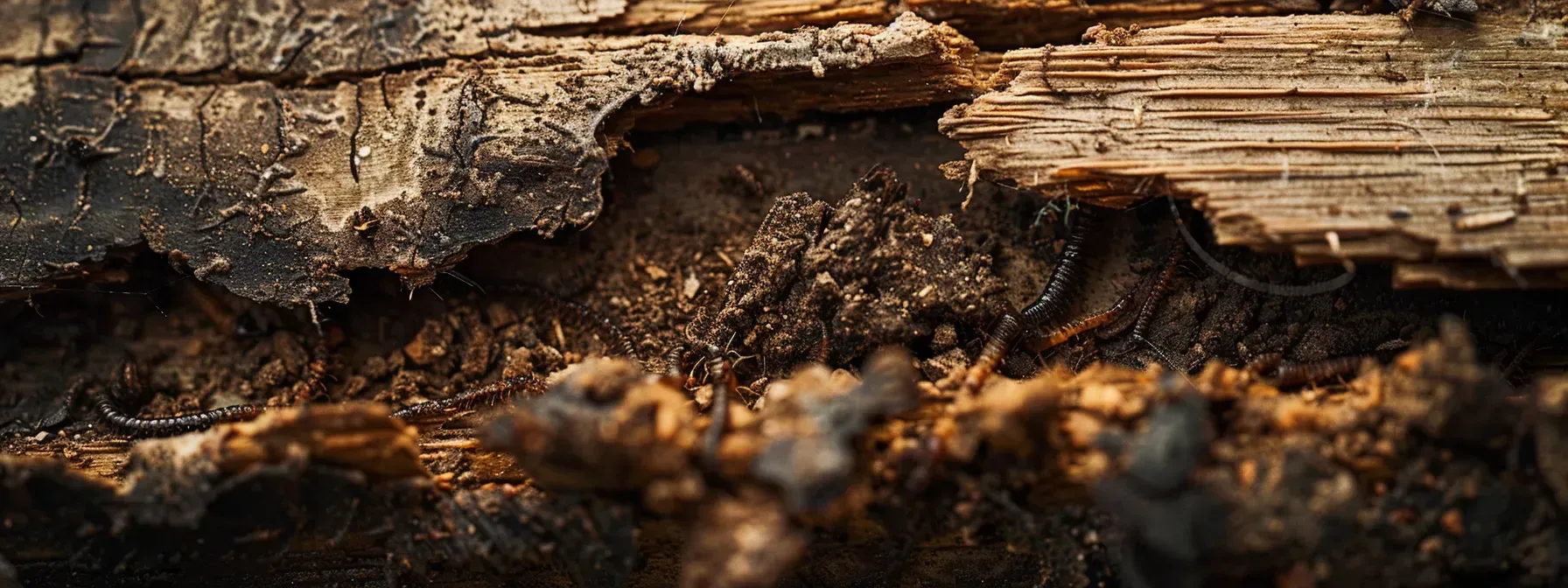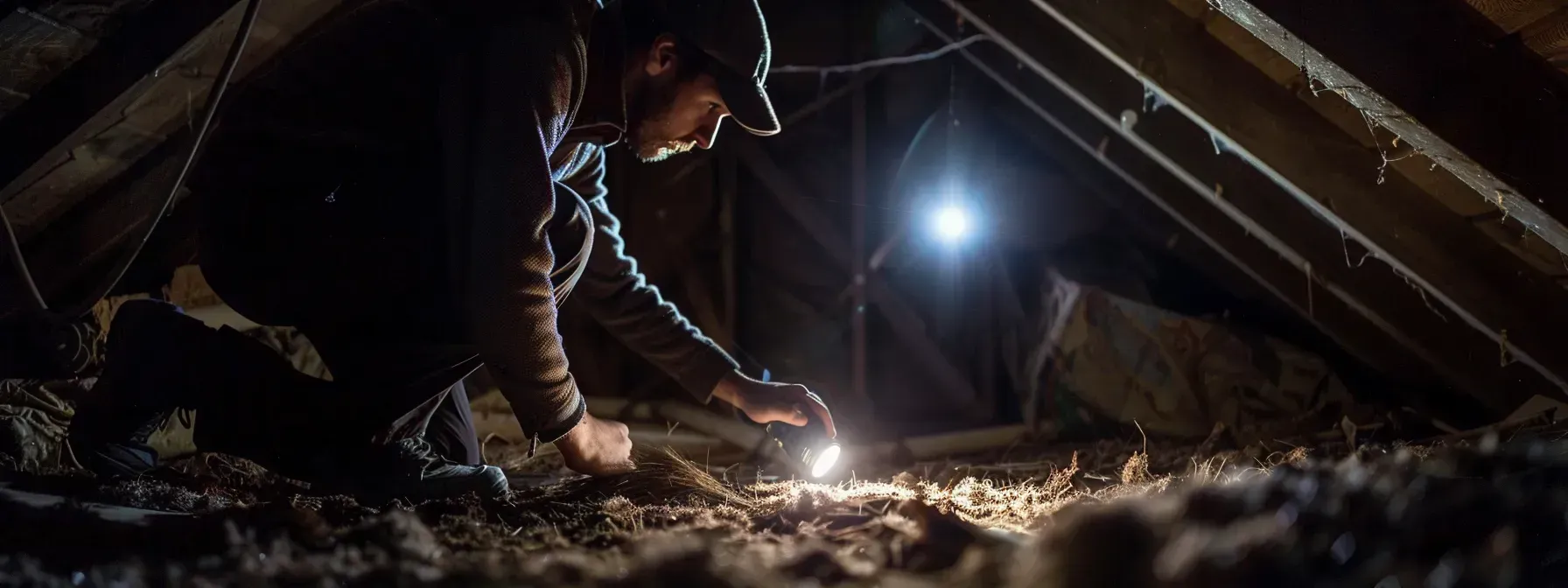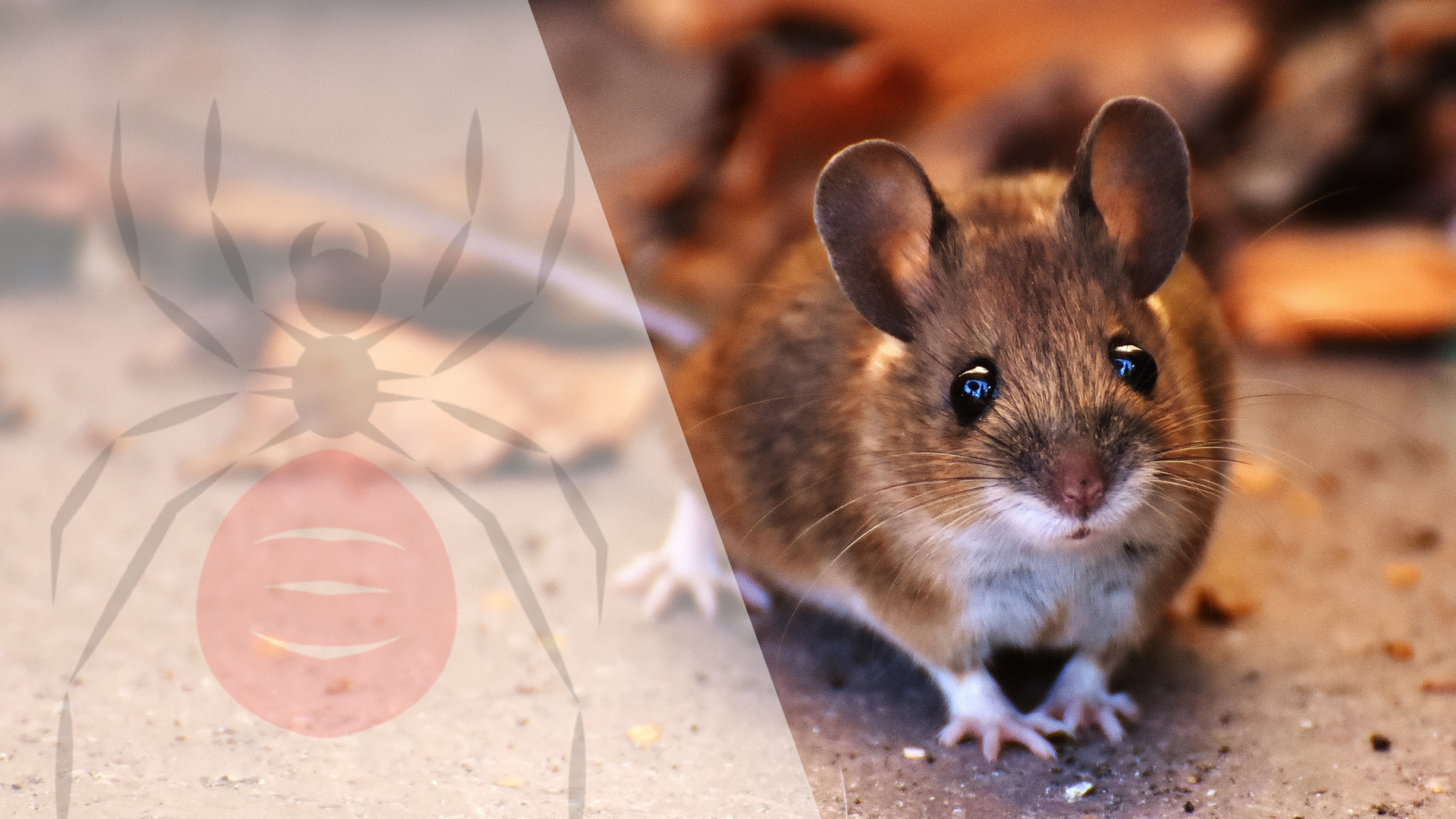Comprehensive Termite Extermination Guide: Essential Tips and Solutions
Written by

Are you hearing a hollow sound when you tap on your wooden structures? You might be hosting unwelcome guests: termites. This guide dives into the nitty-gritty of termite infestations, from assessing damage to effective extermination methods. You'll learn how to safeguard your home against future invasions and understand when to call in the pros versus tackling the problem yourself. Plus, we'll break down the costs involved, so you can make informed decisions about pest control without breaking the bank. By the end of this read, you'll be equipped with the knowledge to protect your home and possibly save on home insurance costs by preventing termite damage.
Key Takeaways
- Early detection of termites can prevent extensive damage and save money
- Professional termite inspections and treatments offer thorough and effective solutions
- Regular home maintenance and moisture control are key to preventing termite infestations
- Termite control methods vary in cost and effectiveness, tailored to specific situations
- Ongoing prevention strategies are crucial for keeping homes termite-free after extermination
Understanding Termite Infestations
Got termites? You're about to get the lowdown on these wood-chomping insects. From the sneaky subterranean to the destructive drywood species, knowing your enemy is step one. Spotting the signs of termite activity early can save your home and your wallet, as most insurance won't cover the damage. Risks? They're not just about the integrity of your beams and baseboards—termites can bring the heat to your property's value and safety. Stick around, and you'll learn how to spot, stop, and prevent an infestation.
Common Species of Termites
When you're up against termites, it's crucial to know which type has taken up residence in your home. The subterranean termite, for instance, is notorious for its underground colonies and insatiable appetite for wood, often entering your home through the crawl space. An inspection can reveal their presence before they cause irreparable harm. On the other hand, drywood termites prefer to set up shop directly in the wood they consume, making them a silent but formidable foe.
Unlike a cockroach or ant invasion, termites aren't as easy to spot, which is why you need to be vigilant. If you're seeing discarded wings or frass (termite droppings), it's time to take action. Solutions like fipronil-based treatments can be effective in combating these pests. Remember, the sooner you identify and address the issue, the better your chances of protecting your home from these destructive invaders.
Signs of Termite Activity in Your Home
Spotting the subtle signs of termite activity in your home can be as tricky as finding a needle in a haystack. You might notice mysterious lines of soil creeping up the walls—these are actually tunnels termites build to travel without exposure. If you're seeing these or finding your lawn dotted with small, cone-shaped mounds, it's a strong hint that termites are nearby. And while you might not be thrilled to find a spider in your home, seeing fewer of these eight-legged critters could indicate that termites are disrupting the natural pest ecosystem in your space.
Now, if you're thinking termites are just another rodent to trap, think again. These critters are in a league of their own, and the damage they do can be stealthy yet extensive. Keep an eye out for hollow-sounding wood or floors that seem more springy than usual. These are telltale signs that termites might be feasting away beneath the surface. For those of you who are proactive, systems like Sentricon offer a bait-and-monitor approach to keep termites at bay, safeguarding your home's structure and your peace of mind.
Risks Associated With Termite Infestations
Imagine you've just discovered a termite infestation in your home. The risks are real and immediate, not just to the wooden structures but also to your finances. Eradicating these pests can be costly, especially if the species you're dealing with is resistant to common treatments. You might be considering a foam solution that targets the colony's heart, but remember, the cost isn't just about the price of extermination—it's also about the potential hit to your property's value if the infestation isn't handled swiftly and effectively.
Now, think about the broader impact of a termite invasion. It's not just wood they're destroying; they can also compromise the integrity of your home, making it a less safe place for you and your family. And while termites don't carry diseases like fleas or mosquitoes, they can trigger allergies and even asthma attacks with their droppings and debris. You need a solution that not only addresses the current infestation but also prevents future ones, ensuring your home remains a safe haven from these hidden destroyers.
Assessing the Extent of Termite Damage

Before you can tackle a termite problem, you need to know the scope of the damage. Conducting a thorough home inspection is your first step. You might consider bringing in professional termite inspection services to uncover the full extent of the issue. They'll help you identify vulnerable areas in your property, from the attic to the foundation. Whether it's tick and mosquito control, fumigation, or rat-proofing, understanding the specific threats to your home is key. This guide will walk you through the process, ensuring you're equipped to protect your home and your plants from these unwelcome guests.
Conducting a Home Inspection
When you're gearing up to check your home for termite damage, think of it as a detective game where you're the sleuth on the trail of a cellulose-loving culprit. You'll want to scrutinize every nook and cranny, from the attic to the basement, for signs of these pests. If you're not sure what to look for, consider calling in a professional inspector. They'll have the expertise and the right pesticide arsenal to spot the subtle hints of an infestation, whether it's a hollow sound in your floorboards or a suspicious line of dirt along the wall. Remember, your zip code might influence the type of termites you're dealing with, so local knowledge is key.
Now, let's say you've found evidence of termites, or maybe you've just got that nagging feeling something's not right. Don't hesitate to reach out to a pest control service. They can provide a thorough inspection and give you peace of mind. Plus, they're trained to identify termite damage that might be mistaken for a less sinister issue, like a mouse problem. By tackling the issue head-on, you're not just protecting your home; you're also looking out for your family's safety and your investment. So, take action, get that inspection scheduled, and rest easy knowing you're on top of it.
Utilizing Professional Termite Inspection Services
When you're ready to get serious about termite treatments, calling in professional termite exterminators is a smart move. These experts come equipped with the tools and know-how to conduct a comprehensive termite inspection, ensuring no corner of your home is overlooked. They'll help you understand the severity of the infestation and the best course of action to protect your home, giving you a clear path to a termite-free environment.
Don't underestimate the peace of mind that comes with professional commercial pest control services. They not only identify the problem areas but also provide you with effective solutions tailored to your situation. With their assistance, you can rest assured that the termite treatments applied will be thorough and your home safeguarded against future invasions. It's about taking decisive steps now to avoid costly repairs later, and these pros are your allies in that mission.
Identifying Vulnerable Areas in Your Property
When it comes to termite extermination, knowing where to look is half the battle. Your home's foundation, wood structures, and damp areas are termite hotspots. Regular checks by residential pest control experts can pinpoint the early signs of termite infestation, saving you from extensive damage and hefty repair bills. They'll zero in on areas like the attic, where wood meets soil, and any place with moisture issues—prime real estate for termites to thrive.
Let's break it down: termites love wood, warmth, and moisture. Pest control services often find them lurking in basements, behind walls, or in crawl spaces where these conditions are met. If you're on the lookout for these critters, here's what you should do:
- Inspect wooden structures for hollow sounds or visible damage.
- Check for mud tubes on exterior walls, a surefire sign of subterranean termites.
- Monitor moisture-prone areas, as termites are attracted to water-damaged wood.
Remember, proactive termite extermination starts with recognizing your home's vulnerabilities. By identifying and addressing these areas, you're not just tackling the current problem—you're preventing future invasions. Trust in professional pest control services to provide a thorough assessment and tailor a defense strategy that keeps your home safe from the silent destroyers known as termites.
Effective Termite Extermination Methods

When you're ready to declare war on termites, you've got a few strategies at your disposal. Pest control companies offer chemical treatments and soil barriers that create a no-go zone for these pests. If you're considering a more targeted approach, implementing baiting systems can lure termites away from your home. For those of you leaning towards greener solutions, exploring natural and eco-friendly options might be the way to go. Each method has its merits, and a quick chat with a pest control company—just request a quote—can help you see what's visible and viable for your situation.
Chemical Treatments and Soil Barriers
When you're up against termites, reaching out to a pest control professional can be a game-changer. They're equipped with chemical treatments that create a barrier in the soil around your home, stopping termites in their tracks. These termite control services apply termiticides that are specifically designed to be long-lasting and highly effective, ensuring that your termite woes are dealt with efficiently.
Imagine the relief of knowing your home is protected by a robust termite treatment plan. Termite pest control experts can install soil barriers that not only eradicate existing colonies but also prevent new ones from forming. This proactive approach to termite control is a smart move to safeguard your home's integrity:
| Termite Control Method | Benefits | Considerations |
|---|---|---|
| Chemical Treatments | Immediate eradication,long-term protection | Professional application recommended |
| Soil Barriers | Prevents new infestations, less invasive | May require periodic inspections |
| Termite Bait System | Prevents new infestations | Less invasive |
Implementing Baiting Systems
If you're grappling with termite infestations, baiting systems are a strategic move you might want to consider. Pest control experts often recommend this method as it targets termites directly, luring them away from your home and into bait stations filled with slow-acting poison. This approach is less intrusive than other treatments and can be particularly effective against subterranean species, which are known for their elusive nature.
Think of baiting systems as a stealthy solution to your termite troubles. They're installed around your property, often in the mulch or near woodpiles, to intercept foraging termites. The fee for this service can vary, but it's a worthwhile investment when you consider the potential savings on extensive repairs. Plus, it's a method that can distinguish between termites and other pests, like the carpenter ant, ensuring the right pest is targeted and your home is protected.
Exploring Natural and Eco-Friendly Solutions
If you're keen on keeping your termite treatment as green as the leaves on a tree, you might want to consider natural and eco-friendly solutions. These methods respect the climate and reduce the chemical footprint on your property. For instance, introducing nematodes – microscopic worms that prey on termite larvae – into the soil can be an effective biological contract against termites. It's a concrete step towards a healthier home environment, and it aligns with sustainable living practices.
Moreover, you can protect your home by leveraging the natural repellent properties of certain plants. For example, planting bee-attracting varieties like mint and marigolds can deter termites due to their strong scents. This approach not only adds beauty to your landscape but also serves as a subtle defense line against these wood-hungry pests. It's a simple, yet smart way to integrate termite control into your daily life without compromising the well-being of your local ecosystem.
Preventing Future Termite Problems

Now that you've tackled the immediate termite threat, let's focus on keeping them at bay. You'll find that a bit of upkeep goes a long way. Home maintenance tips can deter termites, while managing moisture levels around your home is critical in avoiding a repeat infestation. And don't overlook your yard; certain landscaping practices can significantly reduce risks. Each of these strategies is a piece of the puzzle in your ongoing pest control termite defense, ensuring your home stays free from these wood-hungry invaders.
Home Maintenance Tips to Deter Termites
Keeping termites at bay requires a bit of know-how and regular home maintenance. You can start by sealing up any cracks or openings in your home's foundation, as these can be gateways for termites seeking new territories. Expert pest control advice often includes diverting water away from your home's base with proper drainage, which helps prevent the accumulation of moisture that attracts termites. By staying on top of these simple fixes, you're setting up a strong defense against future invasions.
Another smart move is to keep firewood, mulch, and other potential termite food sources away from your home's perimeter. Termite control companies suggest maintaining an 18-inch barrier between wood materials and your home's walls, which can discourage termites from making the leap to your living spaces. Regular inspections by home pest control professionals can also catch early signs of termite activity, such as mud tubes or wood damage, allowing for swift extermination before the problem grows.
Managing Moisture Levels Around Your Home
Keeping your basement and other areas of your home dry is a key strategy in termite prevention. You know that termites are drawn to moisture, so a dry environment can be less inviting for these pests. A pest control pro might suggest dehumidifiers or improved drainage systems as part of a comprehensive pest management plan. By managing moisture, you're not just deterring termites; you're also creating a healthier living space for yourself.
When you're weighing the termite inspection cost against potential damage, remember that action termite control now can save you a bundle later. Regularly check for leaks and fix them promptly to maintain a dry environment that's less attractive to termites. It's a simple, proactive step that can make a big difference in keeping your home safe from these destructive critters.
Landscaping Practices That Reduce Risks
When you're shaping your yard, consider the termite factor in your landscaping choices. Opt for gravel or rock beds near your home's foundation instead of wood mulch, which can be like a welcome mat for termites. If you're planning any new construction, be mindful of the materials you choose; opting for termite-resistant wood or treatments can save you a headache and the price of future exterminations. And remember, keeping the attic clear of wood debris and dust can prevent termites from claiming high ground in your home.
It's also smart to maintain a buffer zone between your garden and your home. By planting shrubs and flowers at a safe distance, you reduce the risk of termites crossing over from your garden bed to your house. Regularly inspect these areas for signs of termite activity, and if you're laying new pipes or cables, ensure they're properly sealed to keep these critters out. These simple steps can make a big difference in safeguarding your home against termite invasions.
Choosing Between DIY and Professional Extermination

So, you're weighing your options for termite control—do you go the DIY route or call in the pros? Evaluating DIY Termite Control Options might seem tempting, especially if you're dealing with a small nest or a lone fire ant. But when it comes to termites, moisture and property are at stake, and a warranty from a professional exterminator can be a game-changer. In the upcoming sections, we'll break down the benefits of hiring a professional exterminator and guide you on how to select a trusted termite control service that suits your needs. Let's get your termite troubles sorted with the right approach.
Evaluating DIY Termite Control Options
When you're sizing up DIY termite control, it's tempting to think you can handle it solo. But before you don your inspector hat, consider the complexity of termite habitats and the precision required to eradicate them. Without the keen eye of a professional, you might miss critical signs of infestation, like subtle wood damage or compromised ventilation systems. And remember, tackling termites is more than just setting up a tent in the yard; it's about understanding the enemy and hitting them where it hurts.
Let's say you've spotted a wasp nest with ease; you might feel confident in your pest control skills. However, termites are a different beast, often requiring specialized knowledge and equipment to fully address the infestation. If you're leaning towards a DIY approach, ensure you're well-versed in the latest termite treatment methods and safety precautions. It's not just about saving a few bucks; it's about protecting your home effectively and efficiently:
| DIY Termite Contro | Professional Extermination |
|---|---|
| Cost-effective for minor issues | Higher upfront cost, but comprehensive |
| Limited to over-the-counter solutions | Access to advanced treatments and techniques |
| Requires personal time and effort | Handled by experienced technicians |
| Potential for missed signs of infestation | Thorough inspection ensures complete eradication |
Benefits of Hiring a Professional Exterminator
If you're in Toms River or anywhere in New Jersey, where homes often feature extensive lumber construction, the risk of water damage and termite infestation is a real concern. Hiring a professional exterminator means you're getting someone who knows how to handle imidacloprid and other potent termite treatments safely and effectively. They have the expertise to assess the extent of damage and apply the right solutions, ensuring your home's structure remains secure.
Imagine the peace of mind you'll have knowing that a seasoned pro is fortifying your home against these relentless pests. A professional exterminator not only brings a wealth of experience to the table but also the latest tools and techniques to ensure that every nook and cranny of your property is termite-free. They'll save you time and the headache of second-guessing whether you've fully addressed the problem.
Selecting a Trusted Termite Control Service
When you're on the hunt for a trusted termite control service, especially in Southern California where the climate can be a termite's paradise, it's essential to look for a team that understands the local landscape. You want a service that not only removes the termites but also takes preventative measures to keep them from returning, like clearing debris and sealing tunnels. An environmentally friendly approach is a bonus, ensuring the safety of your home and the surrounding ecosystem.
Choosing the right termite control service means finding experts who can navigate the unique challenges of your property with precision. Look for a company with a solid track record of success and a commitment to customer satisfaction. They should offer a thorough inspection, followed by a detailed plan of action that includes both treatment and prevention strategies:
- Inspect the company's history and customer reviews to gauge reliability and effectiveness.
- Ensure they use environmentally friendly methods that are safe for both your home and the local Southern California environment.
- Check for comprehensive services that go beyond extermination to include preventive measures against future infestations.
Understanding the Costs of Termite Extermination
When you're staring down a termite problem, understanding the costs involved is as crucial as the extermination itself. You're probably wondering about the factors that influence treatment prices, how different extermination methods stack up cost-wise, and what you'll need to budget for ongoing prevention. Whether you're in Georgia dealing with subterranean termites or elsewhere facing drywall damage, we'll guide you through the financial side of termite control. From liquid treatments that follow the principles of green chemistry to wildlife-friendly options, get ready to plan your expenses with insight and confidence.
Factors Influencing Treatment Prices
When you're sizing up the cost of termite extermination, the size of your home is a major player. Think of it this way: the larger your castle, the more ground there is to cover, and that means more materials and labor. Companies like Orkin often charge by the square foot, so a sprawling mansion will naturally command a higher price than a cozy bungalow. It's not just about the space, though; the complexity of your home's structure can also add to the bill, especially if your beloved antique furniture becomes a gourmet feast for these pests.
Another factor that'll nudge the needle on your termite treatment tab is the method chosen to send those termites packing. If your situation calls for the big guns, like fumigation or extensive soil treatment, you're looking at a heftier investment compared to bait stations or spot treatments. And let's not forget, the severity of the infestation plays its part too. A minor annoyance confined to an old bookshelf is a different beast from a full-blown colony chomping through your support beams. So, when you're budgeting for battle, remember that the scope and strategy of the extermination will shape the final cost.
Comparing Costs of Different Extermination Methods
When you're comparing the costs of termite extermination methods, it's like looking at different paths to the same destination—each with its own price tag. Chemical treatments might offer a more budget-friendly upfront cost, but they can require repeat applications, adding to the long-term expense. On the flip side, fumigation, while pricier, often delivers a knockout punch to extensive infestations, potentially saving you money down the road by nipping the problem in the bud.
You should also consider the cost-effectiveness of baiting systems, which can be a middle-of-the-road option. They're less invasive and can be more affordable than full-blown fumigation, yet more targeted than broad chemical treatments. Remember, the right choice balances effectiveness with expense, ensuring you're not just solving the problem for now, but also investing wisely in your home's future protection.
Planning for Ongoing Termite Prevention Expenses
After you've sent those termites packing, it's wise to think about the ongoing costs to keep them from coming back. Regular termite prevention services, which might include periodic inspections and treatments, are investments in the longevity of your home. You'll want to budget for these to maintain the termite-free status quo, ensuring your home remains a fortress against future invasions.
Consider setting aside funds for annual check-ups with a termite control specialist. These experts can spot potential problems before they escalate, saving you from more extensive—and expensive—damage down the line. It's like having a yearly physical for your home; a little expense now can prevent a major financial headache later, keeping your home safe and sound.
Frequently Asked Questions
How can I tell if I have a termite infestation?
Signs of a termite infestation include visible mud tubes, wood that sounds hollow when tapped, and discarded wings near windows or doors.
What signs indicate severe termite damage in my home?
Severe termite damage often reveals itself through sagging floors, hollow-sounding wood, and visible mazes within walls or furniture.
Which termite extermination methods are most effective?
The most effective termite extermination methods include liquid pesticides, bait systems, and fumigation, each tailored to specific infestation levels and home structures.
How can I prevent termites from returning after treatment?
To prevent termites from returning post-treatment, maintain a dry foundation, apply termite repellents, schedule regular inspections, and ensure wood structures are treated and sealed against future infestations.
Should I tackle termite extermination myself or hire a professional?
Hiring a professional for termite extermination ensures safe, effective, and often guaranteed results, outweighing the risks of DIY methods.
Understanding the nuances of termite infestations is crucial for safeguarding your home's integrity and value. Early detection and identification of termite species, coupled with professional inspection and targeted extermination methods, are key to effective control and prevention. Regular home maintenance and moisture management play pivotal roles in deterring future invasions, ensuring long-term protection. Investing in comprehensive termite extermination and prevention strategies is not just a defense against damage but a proactive step in preserving your property's safety and worth.
Get Quick, Efficient Pest Control & Exterminating
When pests invade your home, waiting isn't an option. At Resolve Pest Management, we understand how urgent these situations can be. That’s why we offer 24-hour emergency pest control services to residents in Lacey, NJ and Bayville, NJ. Whether it’s rodents, insects, or wildlife, our expert team is available day or night to protect your home and restore your peace of mind.
Our treatments are family and pet-friendly, ensuring that your loved ones—including the furry ones—are safe during and after service. We know your time is valuable, which is why we provide rapid scheduling, getting you the help you need, right when you need it.
If you're dealing with a pest emergency, don’t wait! Contact Resolve Pest Management today for immediate assistance. We're here to help make your home pest-free and comfortable again.
24-Hour Emergency Pest Control
We know pests can strike at any time- day or night. Resolve Pest Management is here to help 24 hours a day.

Family & Pet-Friendly Treatments
Protecting loved ones- furry or not is our #1 priority. We use pet-friendly treatments to give peace of mind.

Testimonials
"Resolve Pest Management is absolutely wonderful. Carlos and his team do thorough work and will put your mind at ease. They explain everything that needs to be done or what they suggest should be done. When we first called, Carlos showed up and checked every area of the house. Not only did he handle the mouse issue, he also found termite damage that was unknown to us. Since then, we have regular maintenance and have even called them other issues like bees. The receptionist is also very professional and kind, working with our availability. My family and I highly recommend Resolve Pest Management."
Tonianne D.
Barnegat Township NJ
Get on Schedule Today







